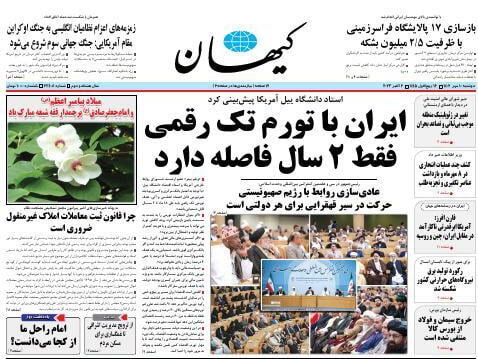US ineffective superpower in face of Iran, China, and Russia

In a note, Kayhan discussed the report of the Foreign Affairs magazine and said: Former U.S. Secretary of Defense Robert Gates has admitted that now the United States is facing more serious threats to its security than in the past decades and maybe forever, and before it had never been faced with four allied opponents - Iran, Russia, China, and North Korea - at the same time.
The problem is that at the moment when events demand a strong and coherent response from the United States, the country is unable to provide one. Opponents are convinced that America has passed its prime and entered an irreversible decline and that the United States must rethink its nuclear strategy in the face of this alliance. Cooperation between Russia (which is modernizing its strategic nuclear force) and China (which is aggressively expanding its small-time force) calls into question the credibility of the U.S. nuclear deterrent, as does North Korea's expanding nuclear capabilities and potential Iran's weapons challenge it.
Shargh: Tehran-Baghdad security agreement is being implemented
In a commentary, Shargh addressed the implementation stage of the Tehran-Baghdad security agreement. It wrote: Based on what the Iraqi officials said, they have implemented three points in this agreement; the Iranian opposition forces were pushed back, the control of the border areas between Iran and Iraq is in the hands of the Iraqi army, and some anti-Iranian armed forces have been disarmed. If these are true, it indicates that the agreement is in effect. According to Hassan Beheshtipour, an expert on international issues, after coming to work for Mr. Raisi's government, “field and diplomacy” have lost their relevance as two separate axes, and it is now impossible to separate them from each other. In fact, in the issue of the security agreement between Iraq and Iran, both the field and diplomacy seemed to work well. Therefore, with the declaration of the Iraqi authorities, a significant part of the military headquarters of the terrorist forces in this area has been evacuated and these forces have been disarmed and moved deep into the Iraqi territory. Also, some of the terrorists' headquarters have been destroyed and the remaining headquarters will be destroyed as well.
Hamshahri: America's new claim about returning to JCPOA
Hamshahri analyzed the new U.S. claim about the JCPOA and wrote: The U.S. Secretary of State, in line with seeking an excuse for not returning to the nuclear agreement, declared that his country is not thinking about returning to this agreement because Tehran has canceled the permission to some inspectors of the Atomic Energy Agency in Iran. This is while Iran's recent move to ban some inspectors of the International Atomic Energy Agency is a sovereign right stipulated in Article 9 of the Comprehensive Safeguard Agreement between Iran and the IAEA. Reacting to the statement of Rafael Grossi, Director General of the International Atomic Energy Agency, Foreign Ministry spokesman Nasser Kanaani said: "Unfortunately, despite the positive, constructive, and continuous interaction of the Islamic Republic of Iran with the IAEA, the three European countries (Britain, France and Germany) and the U.S. destroyed the atmosphere of cooperation between Iran and the IAEA, abused the atmosphere in the Board of Governors for their political purposes." Of course, the Islamic Republic of Iran will continue its positive cooperation within the framework of the agreements made, emphasizing the necessity of the agency's neutrality.
Vatan--Emrooz: Iran's security order for the region
In an explanation, Vatan-e-Emrooz discussed the meeting of Ali Akbar Ahmadian, the secretary of the Supreme National Security Council, with his Armenian counterpart, Armen Grigoryan. It wrote: In this meeting, they discussed the progress in bilateral relations and the latest developments in the South Caucasus region. The authorities of our country have clearly defined the red line in this regard and have given the necessary warnings to the Azeri side in the event of a possible move by Baku to disconnect the border between Iran and Armenia. As the president recently stated again, Karabakh belongs to Azerbaijan, but we emphasize that it is necessary to respect the security rights of the Armenians living in Karabakh and that the state of the borders must be maintained. Based on this, experts believe that Tehran is against separatism and does not accept any local government in Karabakh. Therefore, in the current situation, Iran favors dialogue and peaceful mechanisms, keeping the territorial integrity of the Republic of Azerbaijan, and guaranteeing the rights and security of the Armenians of Karabakh, but any change in the geopolitics of the region will cause insecurity, instability and escalation of the crisis.
Leave a Comment